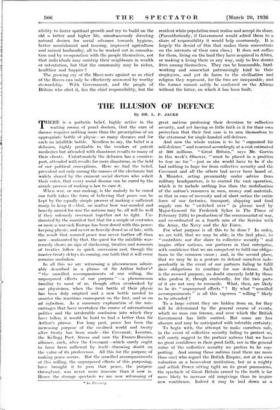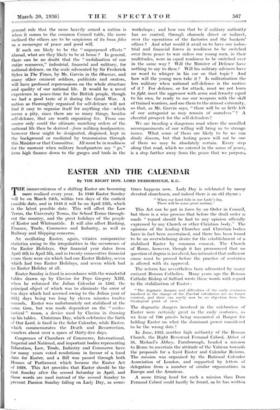THE ILLUSION OF DEFENCE By DR. L. P. JACKS When
war, or war-making, is the malady to be cured our faith takes the form of believing that peace can be kept by the equally simple process of making a sufficient treaty to keep it—that, no matter how war-minded and heavily armed for war the nations may be, all will be well if they solemnly covenant together not to fight. Un- daunted by the manifest fact that for a couple of centuries or more a war-sick Europe has been dosed with this peace- keeping physic, and never so heavily dosed as of late, with the result that assured peace was never further off than now—undaunted by that, the quest for the infallible war- remedy shows no sign of slackening, treaties and rumours of treaties follow in quick succession and, though the master-treaty delays its coming, our faith that it will come remains unshaken.
In all this we are witnessing a phenomenon admir- ably described in a phrase of Sir Arthur Salter's* " the unwilled accompaniments of our willing, the unpurposed effects of our purpose "—a phenomenon familiar to most of us, though often overlooked by our physicians, when the first bottle of their physic has been duly emptied and a new bottle needed to counter the reactions consequent on the first, and so on ad infinitum. As a summary explanation of the mis- carriages that have overtaken the course of international politics and the intolerable confusion into which they have fallen. it would be hard to find a better than Sir Arthur's phrase. For long past, peace has been the increasing purpose of the civilised world and treaty after treaty has been made—the Covenant, Locarno, the Kellogg Pact, Stresa and now the Franco-Russian alliance, each, after the Covenant—which surely ought to have been sufficient by itself—throwing doubt on the value of its predecessor. All this for the purpose of making peace secure. But the unwilled accompaniments of this willing, the unpurposed effects of this purposing, have brought it to pass that peace, the purpose throughout, was never more insecure than it -now is. Hence the strange spectacle we are now witnessing of * In Recorery. great nations professing their devotion to collective security, and yet having so little faith in it for their own protection that their first care is to arm themselves to the uttermost for single-handed self-defence.
And now the whole nation is to be " organised Air self-defence " and rearmed accordingly at a cost estimated at 300 millionS. " Great Britain," says Mr. Garvin in this week's Observer, " must be placed in a position to fear no foe "—just as she would have to be if she had nothing to hope for from collective security and the Covenant and all the others had never been heard of. A Minister, acting presumably under advice from military headquarters, is to control the vast operation, which is to include nothing less than the mobilisation of the nation's resources in men, money and materials, so that in case of necessity and at short notice the entire force of our factories, transport, shipping and food supply can be " switched over " (a phrase used by Major-General Sir Frederick Sykes in The Times of February 24th) to production of the commissariat of war, and co-ordinated as a fourth arm of the Service with the Army, the Navy and the Air Force. For what purpose is all this to be done ? In order? we are told, that we may be able, in the first place, to " contribute our due share to collective security " and inspire other nations, our partners in that enterprise, with confidence that we are competent to fulfil our obliga- tions to the common cause ; and, in the second place, that we may be in a posture to defend ourselves inde- pendently in the event of our partners failing to fulfil their obligations to combine for our defence. Sucli is the avowed purpose, no doubt sincerely held by those who profess it, though confusedly, for the two parts of it arc not easy to reconcile. What, then, are likely to be its " unpurposed effects " ? By what " unwilled accompaniments " is all this vigorous " willing " likely to be attended ?
To a large extent they are hidden from us, for they will be determined by the general course of events, which no man can foresee, and over which the British Government has little control. But some are less obscure and may be anticipated with tolerable certainty.
To begin with, the attempt to make ourselves safe, in the event of collective security failing to protect us, will surely suggest to the partner nations that we have no great confidence in their good faith, nor in the general value of the collective security we profess to be sup- porting. And among those nations (and there are more than one) who regard the British Empire, not at its own valuation as a benevolent institution, but as a mighty and selfish Power sitting tight on its great possessions, the spectacle of Great Britain armed to the teeth is far more likely to increase old misgivings than to inspire new confidence. Indeed it may be laid down as a general rule that the more heavily armed a nation is when it comes- to the common. Council table, the more inclined the others are to be suspicious of its bona fides as a• messenger of peace and good will.
If such are likely to be the " unpurposed effects " abroad, what are they likely to be at home ? In general, there can be no doubt that the " mobilisation of our entire resources,"7 industrial, financial and military, foil national defence, on the scale advocated by Sir Frederick Sykes in The Times, by Mr. Garvin in the Observer, and many other eminent soldiers, publicists and orators, will have profound repercussions on the whole structure and quality of our national life. It would be a novel experience in peace-time for the British people, though we had a good taste of it -during the Great War. A nation so thoroughly organised for self-defence will not find it easy to organise itself for anything else—which seems a pity, since there are so many things, besides self-defence, that are worth organising for. From one source -only could the ultimate marching orders of the national life then be derived —from, military headquarters. however these might be designated, disguised, kept in the background or mediated by transmission through this Minister or that Committee. All must be in readiness for the moment when military headquarters say " go," from high finance down to the gauges and tools in the workshops.; and how can that be if military authority has no control, through -channels direct or indirect, over the operations of the factories and the bankers' offices ? And what would it avail us to have our indus- trial and financial forces in readiness to be switched over from peace to war unless our young men, in their multitudes, were in equal readiness to be switched over in the same way ? Will the Minister of Defence have nothing to say to them ? Will his military advisers have no word to whisper in his ear on that topic ? And how will the young men take it ? Is militarisation the - less military when national self-defence is the motive of it ? For defence, or for attack, must we not learn to fight, meet the aggressor with arms and ferocity equal to his own, be ready to use our weapons with the skill of trained warriors, and use them to the utmost extremity, so that, as Mi. Garvin says, "there will be as little left of our antagonist as may remain of ourselves " ? A cheerful prospect for the self-defenders !
We are treading a dangerous road where the unwilled accompaniments of our willing will bring us to strange issues. What some of-them are likely to be we can dimly discern, but that lasting peace will not he one of them we may be absolutely certain. Every step along that road, which we entered in the name of peace, is a step further away from the peace that we purpose.,



































































 Previous page
Previous page